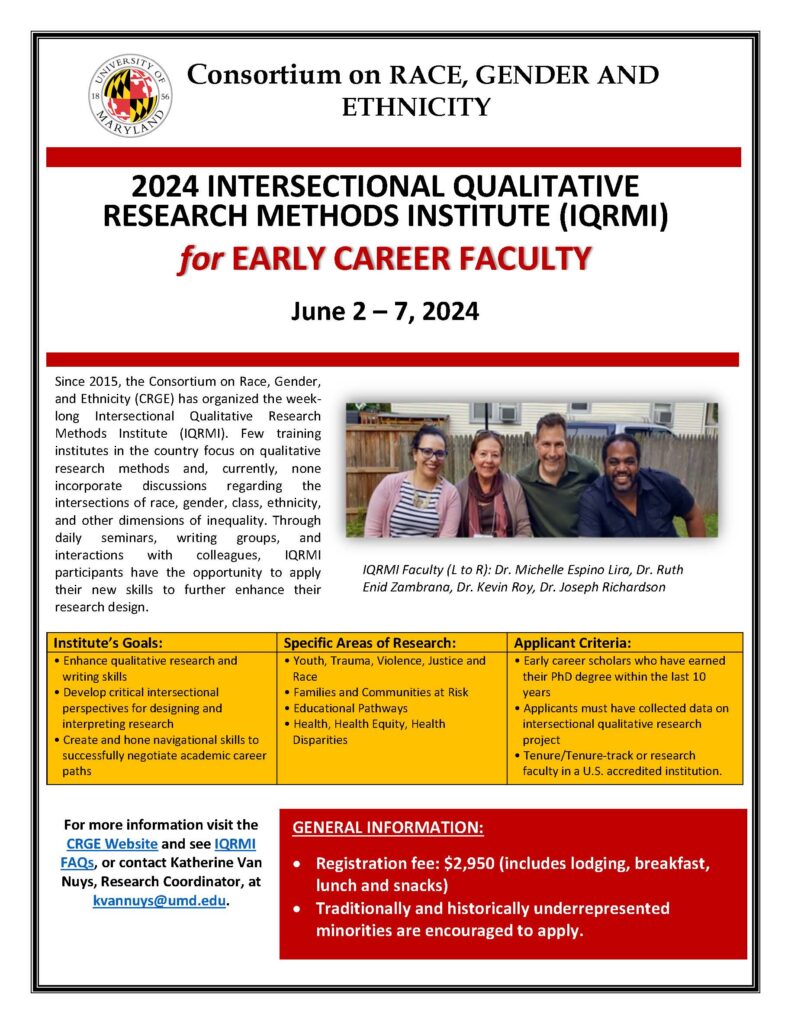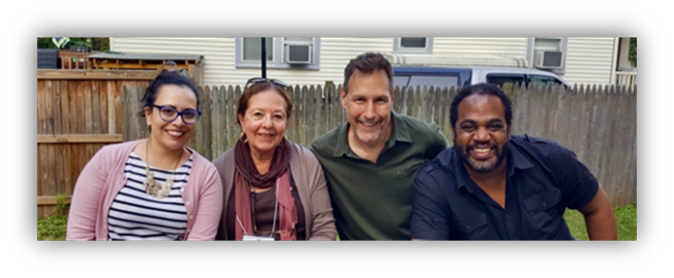Applications for IQRMI 2024 are now closed.
IQRMI for Early Career Faculty: June 2 – 7, 2024
If you are interested in being added to the IQRMI Application Distribution List, please email crge@umd.edu.


IQRMI Faculty (L to R): Dr. Michelle Espino Lira, Dr. Ruth Enid Zambrana, Dr. Kevin Roy, Dr. Joseph Richardson
About The Institute
Since 2015, the Consortium on Race, Gender and Ethnicity (CRGE) has organized the week-long Intersectional Qualitative Research Methods Institute (IQRMI). Few training institutes in the country focus on qualitative research methods and, currently, none incorporate discussions regarding the intersections of race, gender, class, ethnicity, and other dimensions of inequality.
The Intersectional Qualitative Research Methods Institute is the first of its kind in the Committee on Institutional Cooperation (CIC) and nationwide for intersectional early career scholars.
Specific areas of research include the following:
- Youth, Trauma, Violence, Justice and Race
- Families and Communities at Risk
- Educational Pathways
- Health Disparities and Health Equity
Institute’s Goals
- Develop critical intersectional perspectives for designing and interpreting research
- Enhance qualitative research and writing skills
- Develop and hone navigational skills to successfully negotiate academic career paths
The Institute has been generously supported by the New Connections Program, a national program of the Robert Wood Johnson Foundation, and the Office of Diversity and Inclusion at the University of Maryland, College Park.
The Institute includes session such as:
- Intersectional methodology
- Conducting qualitative research with diverse communities
- IRB process for qualitative studies
- Career paths in higher education
Each session has assigned and suggested readings.
How To Apply
Thank you for your interest in the 2024 Intersectional Qualitative Research Methods Institute (IQRMI) for Early-Career Faculty organized by the Consortium on Race, Gender and Ethnicity (CRGE) at the University of Maryland, College Park. IQRMI will take place June 2 – 7, 2024.
Each year CRGE receives an extraordinary number of applications from qualified candidates which makes for a competitive pool. In order for your application to receive full consideration, we will ask for the items below:
1. Current CV: Please upload your current CV in PDF format. The file name should start with your name first. For example, “JaneSmithCV.”
2. Letter of support: The letter must be on an official letterhead from the department Chairperson or Dean of the school or college of your academic appointment. Please upload your letter of support in PDF format. The file name should start with your name first. For example, “JaneSmithLetterofSupport.”
3. Short bio (150 words or less): Please ensure your bio is in 3rd person.
4. Research Narrative (500 words or less): Please describe your qualitative or mixed methods study which has collected data (using interviews, focus groups, photovoice, or observation data) and that you will analyze at IQRMI. The description must include: 1) the intersectional research purpose and sample data available to analyze; 2) an explanation of how IQRMI can be useful in helping you to employ preliminary data for analysis for publication in a peer-reviewed journal or for a grant submission; 3) What additional practical and theoretical skills are you seeking?
Applications for the 2024 Cohort are closed.
Faculty

Dr. Ruth Enid Zambrana is a Professor in the Department of Women’s Studies, Director of the Consortium on Race, Gender and Ethnicity and an adjunct Professor of Family Medicine at the University of Maryland, Baltimore, School of Medicine. Dr. Zambrana’s scholarship applies a critical intersectional lens to structural inequality and racial, Hispanic ethnicity, and gender disparities in population health and higher education trajectories.
She has published extensively and serves on many social science and public health journal editorial boards. Her recent work includes an edited volume with Virginia Brennan and Shiriki Kumanyika, entitled Obesity Interventions in Underserved U.S. Communities: Evidence and Directions (Johns Hopkins University Press, 2014); Latinos in American Society: Families and Communities in Transition (Cornell University Press, 2011) and an edited anthology with Bonnie T. Dill entitled Emerging Intersections: Race, Class and Gender in Theory, Policy and Practice (Rutgers Press, 2009). Her recent awards include the 2013 American Public Health Association Latino Caucus, Founding Member Award for Vision and Leadership, 2013 University of Maryland Outstanding Woman of Color Award for her lifetime achievements, and the 2011 Julian Samora Distinguished Career Award by the American Sociological Association, Sociology of Latinos/as Section for her contributions to the sociology of Latinos and immigrant studies, teaching and mentoring. She was Principal Investigator of a study funded by the Robert Wood Johnson Foundation on Understanding the Relationship between Work Stress at U.S. Research Institutions’ Failure to Retain Underrepresented Minority (URM) Faculty and is currently completing a book on these data. She is frequently invited to give keynote addresses and colloquia at universities, government and non-profit organizations. She has been called upon as a health expert to serve on multiple boards, working groups and special panels for the federal government, Institute of Medicine, other universities and foundations.
 Dr. Michelle M. Espino is an Assistant Professor of Higher Education, Student Affairs and International Education Policy at the University of Maryland, College Park. Her research centers on understanding community contexts and institutional responses associated with educational achievement and outcomes along the academic life course for racial/ethnic minorities, with particular focus on the experiences of Latina/o students, college administrators, and faculty. Her scholarly work illustrates her commitment to advancing diverse perspectives on Latina/o educational attainment, creating connections between the institution and the community to enhance access to higher education, developing innovative approaches to qualitative research, and preparing higher education administrators to work with diverse student populations.
Dr. Michelle M. Espino is an Assistant Professor of Higher Education, Student Affairs and International Education Policy at the University of Maryland, College Park. Her research centers on understanding community contexts and institutional responses associated with educational achievement and outcomes along the academic life course for racial/ethnic minorities, with particular focus on the experiences of Latina/o students, college administrators, and faculty. Her scholarly work illustrates her commitment to advancing diverse perspectives on Latina/o educational attainment, creating connections between the institution and the community to enhance access to higher education, developing innovative approaches to qualitative research, and preparing higher education administrators to work with diverse student populations.
Dr. Espino has published articles in the Review of Higher Education, American Educational Research Journal, Teachers College Record, Equity & Excellence in Education, and Qualitative Inquiry. She currently serves on the editorial boards of the Journal of Diversity in Higher Education and the NASPA Journal on Women in Higher Education. She was the 2015 recipient of the Early Career Award from the American Educational Research Association Hispanic Issues in Research special interest group, the 2015 recipient of the Outstanding Faculty Member award from the NASPA Latina/o Knowledge Community, a 2011 Faculty Fellow for the American Association of Hispanics in Higher Education, the 2008 recipient of the Bobby Wright Dissertation of the Year Award from the Association of the Study of Higher Education, and a 2007 Ford Foundation Dissertation Fellow.
 Dr. Joseph Richardson is an Associate Professor in the Department of African American Studies, University of Maryland. Dr. Richardson joined the African-American Studies faculty in August 2006. He received his Ph.D. from Rutgers University-School of Criminal Justice and his bachelor’s degree in African-American/African Studies from the University of Virginia. Dr. Richardson recently completed a Spencer Foundation Post-Doctoral Research Fellowship at the University of Chicago-Consortium for Chicago School Research. He was also a Research Associate for Chapin Hall Center for Children at the University of Chicago where he was a member of the MacArthur Foundation’s Transitions to Adulthood Research Network. As a doctoral candidate at Rutgers University, Dr. Richardson received a Graduate Research Fellowship from the National Institute of Justice (NIJ) and was a Behavioral Science Training Research Fellow at the National Development and Research Institutes (NDRI). Dr. Richardson’s research interests focuses on how disadvantaged youth and families living in urban communities develop, manage and utilize social capital and their social networks to move out of poverty. Much of his research focuses on the social, cultural and structural factors which impact African-American men: employment, education, incarceration, fatherhood and health. His current research interest focuses on the social context of juvenile re-entry and the reintegration of young African-American males into schools, the work force, communities and families following incarceration. This work also identifies the gaps in social and mental health services for juvenile offenders returning from detention. While working as an ethnographer for the Vera Institute of Justice in New York City, Dr. Richardson completed a four-year ethnographic research study on the social context of adolescent violence among African-American youth living in Central Harlem. This work has produced several academic papers and publications. Dr. Richardson is currently writing a book on the children and families he studied in Harlem entitled “When Flowers Grow in the Cracks.”
Dr. Joseph Richardson is an Associate Professor in the Department of African American Studies, University of Maryland. Dr. Richardson joined the African-American Studies faculty in August 2006. He received his Ph.D. from Rutgers University-School of Criminal Justice and his bachelor’s degree in African-American/African Studies from the University of Virginia. Dr. Richardson recently completed a Spencer Foundation Post-Doctoral Research Fellowship at the University of Chicago-Consortium for Chicago School Research. He was also a Research Associate for Chapin Hall Center for Children at the University of Chicago where he was a member of the MacArthur Foundation’s Transitions to Adulthood Research Network. As a doctoral candidate at Rutgers University, Dr. Richardson received a Graduate Research Fellowship from the National Institute of Justice (NIJ) and was a Behavioral Science Training Research Fellow at the National Development and Research Institutes (NDRI). Dr. Richardson’s research interests focuses on how disadvantaged youth and families living in urban communities develop, manage and utilize social capital and their social networks to move out of poverty. Much of his research focuses on the social, cultural and structural factors which impact African-American men: employment, education, incarceration, fatherhood and health. His current research interest focuses on the social context of juvenile re-entry and the reintegration of young African-American males into schools, the work force, communities and families following incarceration. This work also identifies the gaps in social and mental health services for juvenile offenders returning from detention. While working as an ethnographer for the Vera Institute of Justice in New York City, Dr. Richardson completed a four-year ethnographic research study on the social context of adolescent violence among African-American youth living in Central Harlem. This work has produced several academic papers and publications. Dr. Richardson is currently writing a book on the children and families he studied in Harlem entitled “When Flowers Grow in the Cracks.”
 Dr. Kevin Roy is an Associate Professor and Director of Graduate Studies in the Department of Family Science at the University of Maryland College Park School of Public Health. He is recognized as an expert in the field of fatherhood research, with two decades of experience working with low-income families and community-based parenting programs. His research focuses on the life course of young men on the margins of families and the work force, as they transition into adulthood and fatherhood. Through participant observation and life history interviews, he explores the intersection of policy systems, such as welfare reform, community-based parenting programs, and incarceration, with care giving and providing roles in kin networks. He has received funding for his research from NICHD, the W.T. Grant Foundation, and the National Poverty Center. Roy is a deputy editor for Journal of Marriage and Family and has published in this journal, as well as Social Problems, American Journal of Community Psychology, Journal of Family Issues, and Family Relations. His book Nurturing Dads: Social Initiatives for Contemporary Fathering in the USA Rose Series was published by Russell Sage Foundation Press in 2012. He received a Ph.D. in Human Development & Social Policy at Northwestern University in 1999.
Dr. Kevin Roy is an Associate Professor and Director of Graduate Studies in the Department of Family Science at the University of Maryland College Park School of Public Health. He is recognized as an expert in the field of fatherhood research, with two decades of experience working with low-income families and community-based parenting programs. His research focuses on the life course of young men on the margins of families and the work force, as they transition into adulthood and fatherhood. Through participant observation and life history interviews, he explores the intersection of policy systems, such as welfare reform, community-based parenting programs, and incarceration, with care giving and providing roles in kin networks. He has received funding for his research from NICHD, the W.T. Grant Foundation, and the National Poverty Center. Roy is a deputy editor for Journal of Marriage and Family and has published in this journal, as well as Social Problems, American Journal of Community Psychology, Journal of Family Issues, and Family Relations. His book Nurturing Dads: Social Initiatives for Contemporary Fathering in the USA Rose Series was published by Russell Sage Foundation Press in 2012. He received a Ph.D. in Human Development & Social Policy at Northwestern University in 1999.
Frequently Asked Questions
About
- Early career scholars who have earned their PhD degree within the last 10 years.
- Tenure/Tenure-track or research faculty in a U.S. accredited institution.
- Applicants must have collected data on an intersectional qualitative research project.
Post-docs who fulfill all other requirements are eligible to apply. Historically underrepresented minorities are encouraged to apply.
IQRMI is held annually the first week of June. The Institute will run in-person from June 2 – June 7, 2024.
The Institute takes place on University of Maryland’s College Park campus.
Participants are housed at the College Park Marriott Hotel & Conference Center within walking distance of the University of Maryland College Park campus. Wireless internet and parking are free.
The address of College Park Marriott Hotel & Conference Center is 3501 University Blvd East, Hyattsville, Maryland 20783 USA
Although 1.5 hours morning writing time is included in the daily schedule, IQRMI is not a writing retreat. Participants are assigned a theme-driven Writing Group (e.g., Youth, Trauma, Violence, Justice and Race; Families and Communities at Risk; Educational Pathways; Health Disparities and Health Equity), led by one of the faculty depending on their area of research. Each morning participants establish their writing goals, engage in data analysis and incorporate information they are learning during IQRMI sessions and incorporate them to their writing and analysis.
Participants will utilize the majority of Writing Group Time for quiet writing time, with the opportunity to work individually with faculty on specific issues. Writing Groups can take many forms and these are determined by group and faculty preferences (e.g., discussion groups, quiet writing, 50/50 discussion and writing, etc.) In addition, participants are encouraged to form writing groups in the evenings after the program lectures are over.
At this time we do not offer childcare.
This is a week-long institute that is immersive, intensive and requires extensive group work from early in the morning to early evening. If you wish to bring family, we encourage you to do this before or after the Institute to enjoy the sights in the Washington DC area. Please keep in mind that we do not have child care providers nor are we able to recommend off-site child caretakers.
Cost/Financial
The cost of participating in the Institute is $2,950 which includes lodging and meals (breakfast, lunch, and snacks).
CRGE encourages applicants to seek and obtain approval for institutional funding early in the application process. Applicants should consider seeking funds for travel and IQRMI costs from the Dean’s Office, Faculty Affairs, and respective departments.
At this time we do not offer scholarships.
No. The fee is the same regardless of where you stay due to the costs incurred from coordinating the Institute such as lodging and meal contracts, speaker fees, printing costs, and AV/tech and room charges. Due to the nature of the Institute, we encourage all participants to stay on campus in order to gain a full and enriching experience that includes networking and social activities that occur before and after the Institute activities for each day.
Due to the careful planning and coordination of IQRMI speakers and activities, CRGE cannot refund registration fees in the event a participant cancels. All fees are non-refundable and non-transferable.
Application
It is important that the application clearly states the purpose of the research, the number and description of the demographic characteristics of the sample, the methods to collect data, the analysis plan, and what you expect to accomplish during the time at the institute (i.e., publication, book prospectus, or grant proposal). Sample, method descriptors, and analysis plan are very important for us to evaluate your application. If you do not include these areas but your research is of interest, we may ask you to clarify these aspects during the application review.
The individual writing your letter of support should address the following:
- How does the letter writer know you?
- Describe your knowledge and experience with your research area of interest.
- How would IQRMI strengthen your methodological qualitative skills?
- How would IQRMI benefit your career and research goals?
- The letter writer’s level of recommendation/support.
A letter of support should be completed on official letterhead from the department Chairperson, or Dean of the school or college of your academic appointment.
Post-docs who fulfill all other requirements are eligible to apply. These include:
- Early career scholars who have earned their PhD degree within the last 10 years
- Applicants must have collected data on an intersectional qualitative research project
A letter of support should be completed by a lead administrator of the program, not your research advisor usually. If the fellowship director is the overall administrator of the program and garners information from other faculty to evaluate your participation, then they would be the letter writers. If your research mentor is the only person in that fellowship that you have had any contact with, then they can submit a letter.
If you are receiving an error when applying and/or the application form is not working, please e-mail crge@umd.edu.
For logistical questions, contact crge@umd.edu.
For questions related to research topics or approaches, contact Dr. Ruth Enid Zambrana at rzambran@umd.edu.
You can reach out to crge@umd.edu to assist you with your questions and concerns or arrange an appointment to speak directly with the IQRMI Director, Dr. Ruth Enid Zambrana.
Transportation & Community
The University of Maryland, College Park is a 40 minute to an hour drive from neighboring airports (Reagan National Airport—DCA or Baltimore-Washington International Airport—BWI).
The most cost-effective way to travel in the DC area is by Metro and public transportation:
- From Reagan National Airport, follow the signs to the Metro and take the Yellow Line toward Greenbelt/Fort Totten. You may need to change to the Green Line to get to the College Park station, which is the second to last stop.
- From the BWI Airport, take the B30 bus toward the Greenbelt Metro. When at the Greenbelt Metro station, get on the Green Line toward Branch Avenue. You will only need to ride for one stop before getting off at the College Park station.
A taxi ride from the College Park Metro station to campus would take about 7 minutes and cost around $10.
Taxi fares are usually $50-60 from Ronald Reagan National Airport and $60-70 from BWI Airport.
Alternatively, you may request a charter service through the University. More information on charter services may be found here. The University charter services can support a car of 1-5 people and costs a flat rate of $55 per trip from either Reagan National or BWI airports. Uber or Lyft are additional alternatives.
There are several dining options along Baltimore Avenue depending on your food and cost preference. Click here to view a list Trip Advisor dining recommendations in College Park, or visit Yelp.com to view others.
IQRMI is hosted at the Marriott Hotel in College Park. In a discussion with Marriott supervisory staff in June 2022, they were willing to consider a temporary assignment of one of the restrooms in the Institute area as gender-inclusive. However, we cannot guarantee this will be an option for IQRMI 2024. In the planning process, CRGE staff will ask the Marriott for these accommodations if noted in the accommodation request section.


